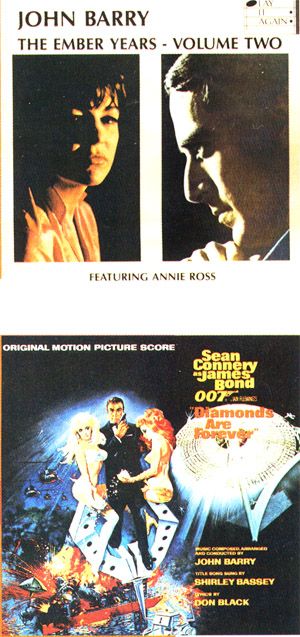

As Barry's career as a film composer took off in the early Sixties, it seemed that he could do not wrong. He won acclaim for writing the music for such films as Zulu (which launched Michael Caine's career), From Russia With Love, Goldfinger (another hit record, for Shirley Bassey, while the soundtrack album went to number one in the US), Sťance On A Wet Afternoon, The Knack, and Thunderball (Tom Jones recorded the theme song). Then, in 1966, came Born Free which not only won Barry two Oscars, but attracted several serious offers f r o m Hollywood.
 However, despite the film's
huge commercial and critical success, Born Free is far from being Barry's favourite piece. "It was a
very unhappy film for me, I didn't
like the director, and he didn't like
me. I didn't get on particularly
well with the film's producer
either!' When I finished the film, I
just walked away because I wanted
to be rid of the whole thin,,. A few weeks later I was in a restaurant in
Soho on my own, when the
screenwriter Wolf Mankiewicz
came in, and asked if he could join
me. He was going to see a preview of Born Free that evening, and did I
want to go with him? I refused,
but he insisted, so I went along and
after the first fifteen minutes of the
film, I turned to him and said, 'It's working like a bitch!' So who
knows from what muddy waters good things will come!"
However, despite the film's
huge commercial and critical success, Born Free is far from being Barry's favourite piece. "It was a
very unhappy film for me, I didn't
like the director, and he didn't like
me. I didn't get on particularly
well with the film's producer
either!' When I finished the film, I
just walked away because I wanted
to be rid of the whole thin,,. A few weeks later I was in a restaurant in
Soho on my own, when the
screenwriter Wolf Mankiewicz
came in, and asked if he could join
me. He was going to see a preview of Born Free that evening, and did I
want to go with him? I refused,
but he insisted, so I went along and
after the first fifteen minutes of the
film, I turned to him and said, 'It's working like a bitch!' So who
knows from what muddy waters good things will come!"
Barry's first American film, The Chase, was followed by The Quiller Memorandum (another spy thriller), The Whisperers, You Only Live Twice (his fifth Bond movie), Boom, and Deadfall. In 1968 he won his third Oscar, for The Lion In Winter, which was about as far removed from James Bond as one could get.
Indeed, it has been Barry's ability to diversify which has kept him in demand for so long as a film composer. Following on from The Lion In Winter, he tackled comedy (Petulia), modern day drama (Midnight Cowboy), westerns (Monte Walsh), period adventure (The Last Valley, allegory (Walkabout), fantasy (Alice's Adventures In Wonderland), and whimsy (Follow Me!), all within the space of two years. His Prolific Output also included television during this period, with his theme for The Persuaders (which starred Roger Moore and Tony Curtis), and scores for such respected tele-movies as Love Among The Ruins, The Corn Is Green, and Eleanor And Franklyn.
As a result, it isn't just tile world's top directors who have vied to work with him, but also the film industry leading song lyricists. Among the latter are Don Black (perhaps his most regular collaborator, with three Bond themes, two musicals, and the Born Free title song to his credit), Leslie Bricusse, Hal David (long-time songwriting partner of Burt Bacharach), and Tim Rice, with whom he wrote All Time High, the title song for Octopussy.
Certainly with the James Bond themes, Barry and his film colleagues had the cream of popular singers and performers to choose from, though the final choice was often swayed by commercial considerations. "We usually got someone who was pretty hot at the time, for example Tom Jones did Thunderball not too long after his huge success It's Not Unusual, while Nancy Sinatra who sang You Only Live Twice had just had a number one hit with These Boots Are Made For Walking. However, when I said I wanted Louis Armstrong to perform a song for On Her Majesty's Secret Service, it wasn't a particularity commercial choice, but I just thought that he would be wonderful for title song, and the film people said, 'Yeah, let's do it'. It's still one of my favourite songs."
Working with Armstrong was a dream come true for Barry. "He was very ill when we did the song, he'd been in hospital and his energy level wasn't very high, but he couldn't have performed the song better. He was the sweetest me you could wish to meet ... at the end of the recording he thanked me for asking him to do it. I almost cried because it was such a honour to have worked with him."
Barry also has a lot of respect for Shirley Bassey who to date has sung three of his Bond songs (Goldfinger, Diamonds Are Forever and Moonraker), as well as the title song for the 1968 thriller Deadfall. "Shirley is great on the Bond songs", because she has such conviction. She just stands up, and sings, and she doesn't ask too many questions either, which for a Bond theme is a virtue!"
Career highlights for Barry during the Seventies included The Man With The Golden Gun, The Tamarind Seed, and Robin and Marian, while in 1979 he wrote the music for science fiction epic The Black Hole, which was not only his first first film for the Disney, but also the first film soundtrack to be recorded in digital stereo.